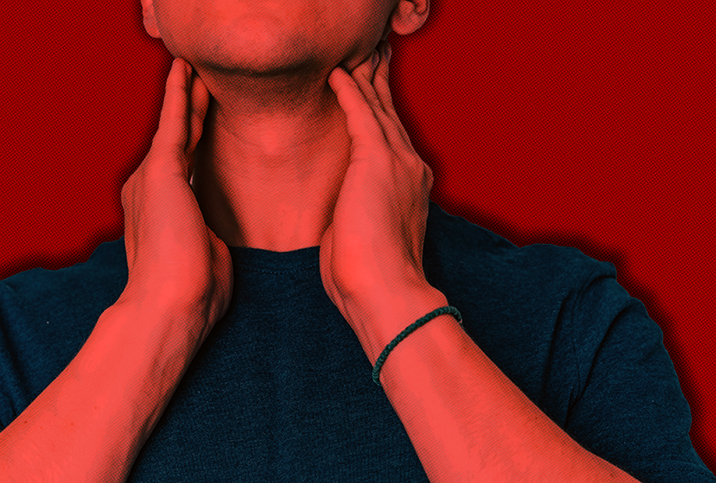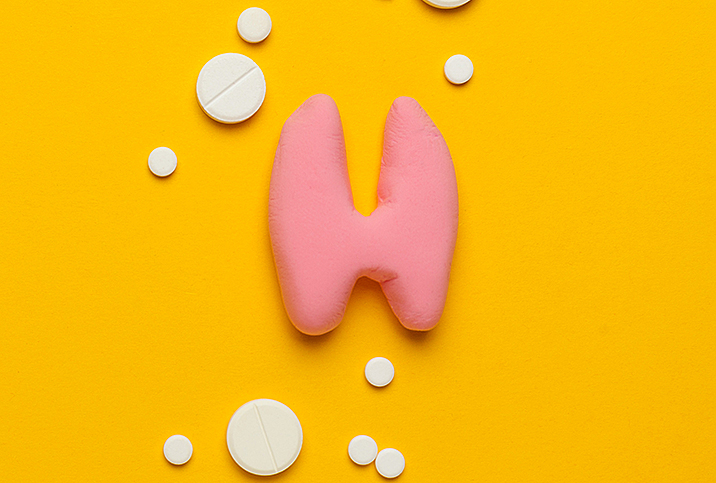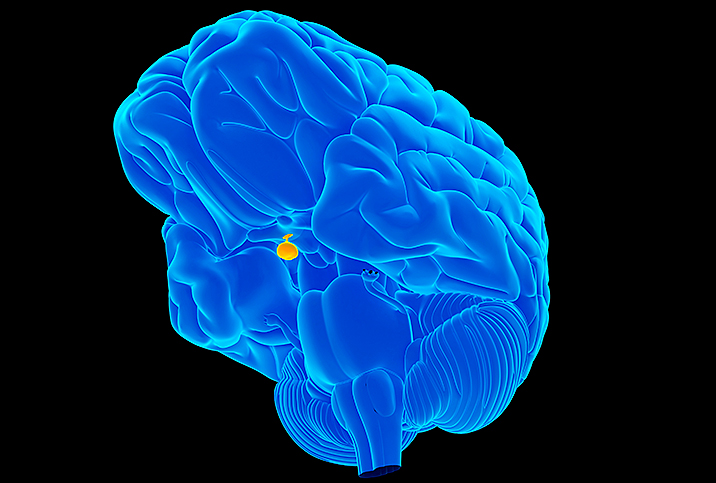An Underactive Thyroid Could Be the Cause of Your ED

The thyroid gland's tiny size belies its significant impact on health—and your sex life. This butterfly-shaped gland located at the base of the neck in front of the windpipe and below the Adam's apple is primarily responsible for producing hormones that regulate the body's metabolism, or how cells use energy.
If the thyroid isn't working, myriad symptoms, including low libido and erectile dysfunction (ED), can arise.
Erections involve an intricate interplay between various bodily functions, including the cardiovascular, endocrine and nervous systems, all of which are affected by thyroid hormones. Although frustrating, occasional erectile difficulties are not necessarily a cause for concern.
If you experience recurring or progressive problems, hypothyroidism (an underactive thyroid) might be to blame.
What is hypothyroidism?
"Hypothyroidism is when thyroid hormone levels are low or deficient, causing a disruption in the body's normal [operation], impacting heart rate, body temperature, sexual function and other aspects of metabolism," said Justin Houman, M.D., a board-certified urologist at Tower Urology in Los Angeles and the medical director for Bastion Health, an app-based telehealth platform for men.
Primary hypothyroidism accounts for 99 percent of cases, but some patients suffer from secondary or tertiary hypothyroidism.
"Primary hypothyroidism is where the thyroid gland does not produce sufficient thyroxine. This is the most common form of an underactive thyroid," said Nicky Keay, M.B., B.Chir., a London-based medical doctor and endocrinologist and the chief medical officer of Forth, a provider of at-home blood tests. "Secondary hypothyroidism is where the pituitary gland is not sending sufficient signals to the thyroid gland."
Tertiary hypothyroidism stems from the hypothalamus' inability to produce adequate thyrotropin release hormone (TRH).
Altogether, thyroid hormones impact several systems and processes, including blood pressure, muscle and bone development and regeneration, digestive function, mood and fertility.
According to Mayo Clinic and the United Kingdom's National Health Service (NHS), hypothyroidism can cause the following symptoms:
- Weight gain
- Low energy
- Difficulty sleeping
- Irritability
- Anxiety
- Decreased muscle mass
- Depression or low mood
- Sensitivity to cold
- Constipation
- Muscle cramps
- Muscle aches and weakness
- Brittle hair and nails
- Hair loss
- Dry, scaly skin
- Joint pain and stiffness
- Carpal tunnel syndrome
- Memory issues
- Difficulty concentrating
- Slowed heart rate
- Puffy face
- Enlarged thyroid gland
- Erectile dysfunction
- Low libido
- Decreased testosterone
A doctor can diagnose thyroid disease with a blood test, but many men are never diagnosed, or they receive an incorrect diagnosis. This can happen, in part, because thyroid issues are significantly more prevalent in women. According to the American Thyroid Association, women—especially those of menopausal age—are five to eight times more likely to be affected than men.
"Hypothyroidism affects about 5 percent of the [general] population by diagnosis, with many more suffering in silence," said Paul Thompson, M.D., a Fort Worth, Texas-based urologist and surgeon and the chief medical officer for Launch Medical, a men's sexual health company in Los Angeles. "According to some studies, between 3 percent and 16 percent of males might have hypothyroidism, and the risk increases with age."
What causes hypothyroidism?
"The main cause of hypothyroidism is an autoimmune condition called Hashimoto's thyroiditis," Houman explained. "Your immune system makes cells that attack your thyroid gland, which keeps it from working properly. Other causes include thyroid cancer, medications and lack of iodine in the diet."
Hashimoto's, like most autoimmune diseases, disproportionately affects women. About 12 million of the 14 million Americans with the disease are women.
Experts aren't sure what causes Hashimoto's, though genetic and environmental factors likely contribute. Parasitic, yeast or bacterial infections in the gastrointestinal system and radiation exposure might also factor in, though more research is needed.
More rarely, thyroid surgery, radiation therapy or excessive response to hyperthyroidism treatment can inhibit thyroid function.
How does hypothyroidism affect sexual function?
Hypothyroidism can hurt both men and women sexually, according to Thompson. In addition to low libido, hypothyroidism in men is associated with premature and delayed ejaculation and ED. Research indicates hypothyroidism in men can also diminish semen quality, sperm count and testicular function. Untreated, it can lead to infertility.
Most men with thyroid disorders experience ED. A 2008 study published in the Journal of Clinical Endocrinology & Metabolism found 79 percent of the 71 participants with thyroid dysfunction had some degree of ED compared with about 33 percent of men in the control group.
Houman said hypothyroidism's effect on erectile function is due, in part, to the decrease in testosterone levels. An underactive thyroid can also hinder performance in the bedroom because of the fatigue, anxiety and low mood it can induce, in addition to decreased blood flow to the penis.
Treatment options
Hypothyroidism's sexual side effects usually disappear with successful treatment of the disease. Doctors typically prescribe a daily dose of levothyroxine, a synthetic thyroid hormone, to replace what the body is lacking. Most patients take the medication for life.
According to the NHS, the medication does not typically produce side effects. However, taking too much may cause sweating, chest pain, diarrhea, nausea and vomiting. If you experience such complications, the best advice is to talk to your doctor about altering your dose.


















